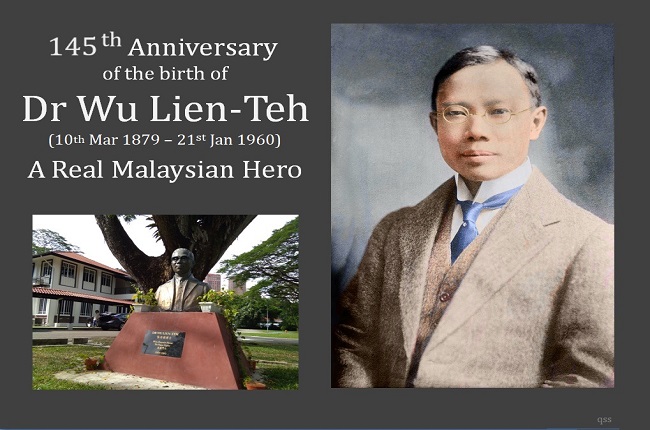Dr. Wu Lien-teh was a pioneering figure in medicine, especially known for his groundbreaking work in public health. His contributions have significantly influenced the field of epidemiology and continue to resonate in today’s healthcare practices. In this article, I will explore five incredible contributions made by Dr. Wu Lien-teh that shaped the landscape of modern medicine.
1. Combatting the Pneumonic Plague
One of Dr. Wu Lien-teh’s most notable contributions was his role in managing the pneumonic plague outbreak in Manchuria in 1910.
Key Actions
- Leadership Role: Appointed by the Qing government, Wu led efforts to control the epidemic, which was wreaking havoc in the region.
- Quarantine Measures: He enforced strict quarantine protocols, effectively isolating infected individuals to prevent further spread.
- Public Health Education: Dr. Wu emphasized educating the public on hygiene practices to mitigate the effects of the plague.
Through his leadership, the mortality rate dropped dramatically, showcasing the importance of decisive action in public health crises. Wu’s strategies exemplified how effective public health interventions could save lives, a lesson still relevant today.
For more information on public health management, you can check out this article.
2. The Invention of the Wu Mask
Another significant contribution of Dr. Wu Lien-teh was the invention of the Wu mask, a critical innovation during the pneumonic plague outbreak.
Features of the Wu Mask
- Respiratory Protection: Designed to protect healthcare workers from respiratory infections, the Wu mask is considered a precursor to modern N95 respirators.
- Widespread Use: It was quickly adopted by medical professionals, showcasing the necessity of protective gear in healthcare.
The Wu mask represented a pivotal shift in how medical professionals approached infectious diseases. Today, masks are essential in controlling the spread of diseases, as we have seen during the COVID-19 pandemic. The design of the Wu mask helped establish the foundation for future innovations in respiratory protective equipment.
For more insights into modern protective gear, check this link on Ford Mustang Mach-E updates.
3. Advocacy for Public Health
Dr. Wu Lien-teh was not only a physician but also a passionate advocate for public health reform in China.
His Efforts Included
- Campaigning Against Opium: Wu co-founded the Anti-Opium Association, advocating against the opium trade in the early 20th century.
- Medical Reforms: He pushed for reforms in medical education and public health policies, emphasizing the importance of sanitation and preventive measures.
- International Collaboration: Wu sought international cooperation to improve healthcare practices in China, understanding that global collaboration is vital for tackling health crises.
His advocacy laid the groundwork for significant public health reforms that shaped the future of healthcare in China. By addressing the social and health issues associated with the opium trade, Dr. Wu not only improved individual health outcomes but also contributed to broader societal change.
4. Contributions to Epidemiology
Dr. Wu Lien-teh’s work significantly advanced the field of epidemiology, especially regarding infectious diseases.
Important Aspects of His Research
- Epidemiological Studies: He conducted extensive research on various infectious diseases, contributing valuable knowledge to the medical community.
- Innovative Methods: Dr. Wu introduced methods to track disease outbreaks and analyze their spread, which are still relevant today.
- Publications: His numerous articles and studies provided crucial insights into disease management and prevention strategies.
By integrating scientific research with practical applications, Dr. Wu greatly enhanced our understanding of how diseases spread and how to combat them. His work laid the foundation for modern epidemiological practices, which remain critical in our efforts to control infectious diseases.
5. Legacy of Medical Leadership
Dr. Wu Lien-teh’s legacy continues to inspire healthcare professionals and public health advocates around the world.
Lasting Impacts
- Recognition: He was nominated for the Nobel Prize in Physiology or Medicine in 1935, a testament to his significant contributions to medicine.
- Influence on Modern Medicine: His innovative approaches have influenced modern public health practices, particularly in infection control.
- Education and Training: Dr. Wu’s commitment to education has inspired generations of medical professionals to pursue careers in public health.
Today, his contributions remind us of the importance of innovation, leadership, and advocacy in the ever-evolving field of medicine. The principles he advocated for continue to be fundamental in training healthcare professionals and shaping health policies worldwide.
Dr. Wu Lien-teh Biography
Dr. Wu Lien-teh biography explores the life of a remarkable physician and public health advocate. Born in 1879, he dedicated his life to combating infectious diseases, most notably during the pneumonic plague outbreak in Manchuria. His biography reflects not only his medical achievements but also his advocacy for public health reforms in China. This rich history includes his invention of the Wu mask, a precursor to modern respiratory protection. To dive deeper into the fascinating life of Dr. Wu Lien-teh, you can read his biography here.
Dr. Wu Lien-teh Contributions to Medicine
Dr. Wu Lien-teh’s contributions to medicine encompass a range of innovative practices and policies that have shaped public health. His efforts during the pneumonic plague outbreak saved countless lives and showcased the critical role of epidemiology. He also emphasized the importance of sanitation and hygiene, paving the way for modern public health initiatives. His legacy endures through ongoing medical research and education inspired by his work. To learn more about his impactful contributions, explore this resource here.
Dr. Wu Lien-teh Public Health
His public health initiatives significantly transformed health policies in China and beyond. As a leader in the fight against infectious diseases, Dr. Wu Lien-teh established quarantine protocols and advocated for public education on hygiene practices. His work during the 1910 pneumonic plague outbreak demonstrated the power of proactive measures. Today, his approaches continue to influence how we address global health challenges. For more on his public health impact, visit this informative link here.
Dr. Wu Lien-teh Achievements
His achievements are notable milestones in the history of medicine. He gained recognition for his successful management of the pneumonic plague outbreak in Manchuria and for inventing the Wu mask, which provided vital protection against respiratory diseases. Throughout his career, he advocated for medical education and public health reform, leaving a lasting impact on healthcare practices. His achievements inspire future generations of medical professionals.
Dr. Wu Lien-teh Impact on Healthcare
The impact on healthcare is felt today, as his innovative practices laid the groundwork for modern public health strategies. His approach to managing infectious diseases emphasized the need for early intervention and community involvement. Advocacy for improved sanitation and health education has contributed to significant advancements in healthcare systems worldwide. By studying his impact, we can learn valuable lessons applicable to contemporary health crises.
Dr. Wu Lien-teh and the Pneumonic Plague
His role in managing the pneumonic plague is intrinsically linked, as he played a crucial role in one of the deadliest outbreaks in history. Appointed by the Qing government, he implemented strict quarantine measures and public health education to combat the spread of the disease. Leadership during this time not only saved lives but also advanced the field of epidemiology. The strategies employed during the plague continue to inform our responses to infectious disease outbreaks today. To learn more about this significant historical event, click here.
Dr. Wu Lien-teh Inventions
Inventions, particularly the Wu mask, revolutionized respiratory protection in medicine. Designed during the pneumonic plague outbreak, this mask was a groundbreaking innovation that laid the foundation for modern protective equipment. His inventions reflect a commitment to safeguarding public health and enhancing the safety of healthcare workers. Today, the principles behind these inventions are evident in the masks and protective gear used during health emergencies. For further details on his inventions, visit this page here.
Dr. Wu Lien-teh Legacy in Medicine
His legacy in medicine is marked by unwavering dedication to public health and pioneering work in epidemiology. Efforts during the pneumonic plague and advocacy for sanitary practices have left an indelible mark on healthcare practices today. This legacy continues to inspire medical professionals and public health advocates worldwide, reminding us of the importance of proactive health measures.
Conclusion
Dr. Wu Lien-teh was a remarkable figure whose contributions have profoundly impacted public health and medicine. From his pioneering work during the pneumonic plague outbreak to his lasting legacy in epidemiology and advocacy, his influence is evident in many modern healthcare practices.
As we navigate the complexities of today’s health challenges, the lessons learned from Dr. Wu’s life and work continue to resonate, emphasizing the importance of proactive measures and public health education.
FAQs about Dr. Wu Lien-teh
1. What is Dr. Wu Lien-teh best known for?
Dr. Wu Lien-teh is best known for his leadership in combating the pneumonic plague outbreak in Manchuria and inventing the Wu mask.
2. How did Dr. Wu contribute to public health?
He advocated for reforms, educated the public about hygiene, and campaigned against the opium trade, significantly improving public health policies.
3. What was the Wu mask?
The Wu mask was designed to protect healthcare workers from respiratory infections and is considered a precursor to modern N95 respirators.
4. What legacy did Dr. Wu leave behind?
Dr. Wu’s legacy includes advancements in epidemiology, public health advocacy, and the continued influence of his innovative practices in modern medicine.
5. Was Dr. Wu recognized internationally?
Yes, Dr. Wu was nominated for the Nobel Prize in Physiology or Medicine in 1935 for his contributions to medicine and public health.
By incorporating Dr. Wu Lien-teh’s story and contributions, we can better understand the significance of proactive health measures and the enduring impact of medical leaders throughout history.
You May Also Like:











